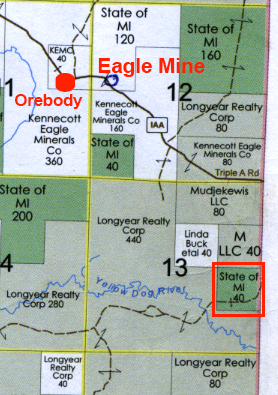
MARQUETTE – The Eagle Mine LLC, currently owned by international mining conglomerate Lundin Mining, is seeking a new mineral lease from the State of Michigan for 40 acres of land (NE 1/4 SE 1/4, Section 13, T50N, R29W, Michigamme Township, Marquette County) beside the Yellow Dog River, a federally-recognized National Wild and Scenic River with a status of ‘excellent’ water quality.
According to documents obtained by grassroots organization Save the Wild U.P. (SWUP), Michigan’s Department of Natural Resources (DNR) has known about this application since July. The DNR’s announcement of Lundin Mining’s mineral rights lease application was published on Monday October 20th, 2014, commencing a legally-required 30-day public comment period.
SWUP contends the DNR and the Department of Environmental Quality (DEQ) have institutional conflicts of interest in regulating metallic sulfide mining. Most recently, the organization has found that just one month after Lundin’s Eagle Mine submitted a letter of interest to Michigan’s DNR, the DNR Fisheries Division changed its 2003 recommendation of “Non-development” to “Development, with no restrictions” in August of this year. DNR retains restrictions on the property for a recreational trail, endangered plants, and “neotropical migrants” including Kirtland’s warbler.
SWUP encourages concerned citizens to demand a Public Hearing and a transparent, democratic evaluation of the proposed lease by sending an email Karen Maidlow, Property Analyst, Minerals Management, Michigan Department of Natural Resources, at maidlowk@michigan.gov, while copying info@savethewildup.org as the organizations is maintaining an independent analysis of comments received. Comments regarding the mineral rights lease can be mailed directly to Karen Maidlow, Property Analyst, Minerals Management, DNR, P.O. Box 30452, Lansing, MI 48909.
“It’s no surprise that Lundin is seeking to lease more minerals,” says attorney Michelle Halley. “Save the Wild U.P., the Yellow Dog Watershed Preserve, and others have known that Eagle Mine is just the beginning of a regional mining development strategy. In the long term, the public will pay a high price for mining projects performed with inadequate permitting, monitoring and enforcement.”
Save the Wild U.P.’s president Kathleen Heideman is outraged. “It’s alarming that the State of Michigan is seriously considering this mineral lease request. The land in question is only one hundred feet from the Yellow Dog River’s 100-year floodplain, which means the land is vulnerable to extreme flooding events (King & MacGregor Environmental, Inc., 2011). For me, that’s a giant neon sign spelling R-I-S-K-Y: sulfide ore and water are a dangerous mix! Also, the DNR’s Wildlife staff identified the land as habitat for the Kirtland’s Warbler, a state and federally-listed Threatened and Endangered species.”
“Mining activity on this land poses a direct threat to the Yellow Dog River: land disturbance, drilling contamination, groundwater impairment, surface water pollution, you name it. The DNR needs to reconsider their classification of the property’s restrictions. Given the river’s proximity, this land is absolutely too sensitive to allow mining development,” says Cynthia Pryor, watershed resident and dedicated environmental watchdog.
According to SWUP Director Alexandra Thebert, “Leasing mineral rights means drilling, and drilling can quickly lead to a new mine. We must ensure that the enormous liability of mining on State-owned land isn’t a burden shifted to taxpayers while increasing the profits of a foreign mining company.”
“Public lands belong to the public — not private corporations. This is not an isolated parcel of surplus land,” said Jon Saari, vice president of SWUP. “It adjoins another 840 acres of contiguous State Land on the Yellow Dog Plains.” Current recreational use includes camping, fishing, hunting, ATV riding, and snowmobiling. Marquette County’s Snowmobile Trail #5 runs right through the property – as does the controversial County Road 595 route defeated last year.
Gene Champagne, Concerned Citizens of Big Bay, sees a pattern of deception and creeping industrialization of the Yellow Dog Plains. “Clearly, mineral leasing leads to surface operations – and the land under consideration in this proposed mineral lease is only half a mile from the freshly-paved Triple A road. We renew our call for a federal corruption investigation concerning the State’s failure to regulate Eagle Mine, fraudulent permitting, bait-and-switch electrical infrastructure, the steamrolling of road upgrades, and total disregard for cumulative environmental impacts.”
“This mineral lease request should be denied,” agreed Alexandra Maxwell, SWUP outreach coordinator. “Metallic mineral lease of this land would serve only the short-term goals of Industry at the immediate and long-term expense of taxpayers. Once again, the State of Michigan seems wholly incapable of serving the public trust. We demand that a Public Hearing be held.”
Founded in 2004, Save the Wild U.P. is dedicated to protecting our communities, lakes, and lands from the hazards of sulfide mining, which threatens to contaminate nearby watersheds – including Lake Superior – with acid mine drainage. SWUP continues to raise public awareness about mining exploration and development, regulatory errors and conflict of interest issues. More information is available at savethewildup.org or by calling (906) 662-9987.
* Note: we’re partnering with the Yellow Dog Watershed Preserve to send a unified, clear message to the Michigan DNR: deny Eagle Mine’s application for a mineral lease on the Yellow Dog River!
Protect your public lands and clean water: sign the petition here.
There is a continuing problem with mining corporations and the Michigan Department of Natural Resources, the latter being the state agency that is supposed to be representing the public and state-owned land, not foreign and other mining corporations which come and extract natural resources, risk potential damage to forest lands and watersheds, then mainly export these minerals to other countries and reap the profits. Meanwhile, the aftermath is left for the public to deal with, and oftentimes the toxic results cannot be corrected. Once pollution has contaminated these areas, clean-up is both costly and the remedy is often too late to be effective.